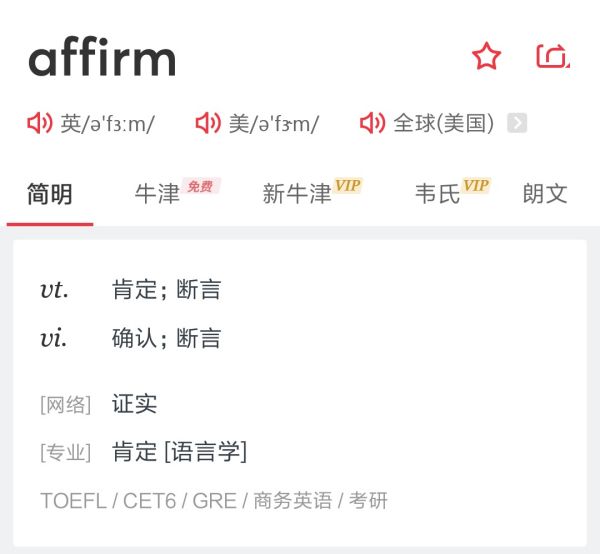assert和affirm的区别
Posted
tags:
篇首语:本文由小常识网(cha138.com)小编为大家整理,主要介绍了assert和affirm的区别相关的知识,希望对你有一定的参考价值。
两个词都有断言的意思,具体有什么区别呢?
assert :“宣称,坚持”,指不管事实如何,是否有证据在所不提,主观自信地宣称;
affirm :“断言,肯定”,指根据事实坚信不移地宣称,而且有可靠证据,任何时候都不动摇。
例句:
1.Justice will assert itself,正义必将伸张。
2.He asserted his innocence of the crime.他坚称自己无罪。
3. I affirm I can like it,我肯定我会喜欢它。
4.The ministers issued an affirmation of their faith in the system.部长们表示了对该体制坚定的信心。

扩展资料:
其他相近意思的英文单词辨析:
1.claim, “声称,主张”,往往表示说话者反对或不同意某一观点,或指根据某种规定提出的要求或主张。
2.allege, “宣称,断定”,指在无真实凭据情况下宣称。
例句:
A.It has been alleged that Jack stole the money. 有人声称钱是杰克偷的。
B.She claims to be a good pianist. 她声称是位优秀的钢琴家。
参考资料来源:百度百科——assert
参考资料来源:人民网—教育—考研英语冲刺要领
参考技术A区别如下:
1、使用场合不同:
assert的使用场合多为非正式的、一般的场合。
affirm的使用场合则较为正式,一般都是公开场合。
2、态度不同
assert的态度一般都较为主观,带有强烈的个人色彩。
affirm的态度则较为客观,不含个人感情色彩。

3、含义不同:
assert宣称、断言,常指某人主观自信,坚持己见,有时不顾客观事实而断言下结论;
affirm指以事实为依据,深信不疑地肯定某种观点或看法。
4、语境不同:
assert坚持自己的主张,表现坚定,多为主观判断;
affirm 证实,确认 ,客观意识强。
5、判断依据不同:
assert指断然声称某种结论,判断往往没有依据或有证据但不一定确实;
affirm指公开宣称某事属实,是有判断依据,强调坚信不疑的态度。
参考技术Bassert和affirm的区别
1、意思不同。assert的意思有断言、声称、维护、坚持、主张拥有显示、确立、声明、维护、宣称;affirm的意思有断言、肯定、证实、确实。

2、语境不同。assert声称某种结论,多为主观判断;affirm指公开宣称某事属实,强调坚信不疑的态度。客观性比较大
3、概念不同。affirm指不管事实如何,主观自信地宣称,没有任何证据;指公开宣称某事属实,有可靠的证据。
assert例句:
She continued to assert that she was innocent.
她仍然坚称自己无辜。
The republics began asserting their right to govern themselves.
各加盟共和国开始要求获得自治权。
affirm例句:
Both sides affirmed their commitment to the ceasefire.
双方均申明答应停火。
I can affirm that no one will lose their job.
我可以肯定,谁都不会丢掉工作。
参考资料:
百度百科-Affirm
百度百科-assert
参考技术Cassert和affirm的区别:
一、反音。
1、assert,英 [əˈsɜ:t] 美 [əˈsɜ:rt] 。
2、affirm,英 [əˈfɜ:m] 美 [əˈfɜ:rm]
二、词性含义。
1、assert,vt.声称,断言;维护,坚持;坚持自己的主张;生效。
2、affirm,vt.& vi.断言,肯定;证实,确实;[法]不经宣誓而庄严宣布;承认。
三、单词变形。
1、assert,第三人称单数: asserts 现在分词: asserting 过去式: asserted 过去分词: asserted
2、affirm,第三人称单数: affirms 现在分词: affirming 过去式: affirmed 过去分词: affirmed,派生词: affirmation n.

四、实际运用举例。
1、assert
明确肯定;断言
[V that] She continued to assert that she was innocent.
她仍然坚称自己无辜。
[VN] She continued to assert her innocence.
她仍然坚称自己无辜。
2、affirm
(formal) 肯定属实;申明;断言
同义词: confirm
[VN] Both sides affirmed their commitment to the ceasefire.
双方均申明答应停火。
[V that] I can affirm that no one will lose their job.
我可以肯定,谁都不会丢掉工作。
参考技术Dassert和affirm的区别:
affirm 断言,肯定,指根据事实坚定不移地宣称,有无可争辩之意。
assert 宣称,坚持,指不管事实如何,主观自信地宣称。
affirm “断言,肯定”,指根据事实坚信不移地宣称,而且有可靠证据,任何时候都不动摇,有无可争辩之意
例句:
①I can affirm that no one will lose their job.
我可以肯定,谁都不会丢掉工作。
②The ministers issued an affirmation of their faith in the system.
部长们表示了对该体制坚定的信心。
assert “宣称,坚持”, 主观意味强,指自认为某事就是如此,而不管事实如何。
例句:
①She asserted that she was innocent.
她坚称自己清白无辜。
②He asserted his innocence of the crime.
他坚称自己无罪。

扩展资料:
1, affirm:verb
(formal) 肯定属实;申明;断言
to state firmly or publicly that sth is true or that you support sth strongly
同义词: confirm
[VN] Both sides affirmed their commitment to the ceasefire.
双方均申明答应停火。
[V that] I can affirm that no one will lose their job.
我可以肯定,谁都不会丢掉工作。
【派生词】affirmation noun
[U, C] She nodded in affirmation.
她肯定地点了点头。
2,assert:
verb
1明确肯定;断言
to state clearly and firmly that sth is true
[V that] She continued to assert that she was innocent.
她仍然坚称自己无辜。
[VN] She continued to assert her innocence.
她仍然坚称自己无辜。
[V speech] ‘That is wrong,’ he asserted.
“那是错的。”他断言道。
[VN that] It is commonly asserted that older people prefer to receive care from family members.
人们普遍确认,老年人更愿意由家人照顾。
2[VN] ~ yourself
坚持自己的主张;表现坚定
to behave in a confident and determined way so that other people pay attention to your opinions
3[VN] 维护自己的权利(或权威)
to make other people recognize your right or authority to do sth, by behaving firmly and confidently
to assert your independence/rights
维护独立 / 权利
I was determined to assert my authority from the beginning.
我决心一开始就维护我的权威。
4[VN] ~ itself
生效;起作用
to start to have an effect
Good sense asserted itself.
明智服人。
参考资料:assert——百度翻译
python raise和assert的区别
python中raise和assert的区别
一、使用raise抛出异常
python可以自动触发异常,raise(内置函数)的定义为显示的抛出异常,用户可以使用raise进行判断,显式的引发异常,raise执行后程序将不再向下执行。
式例:
#!/usr/bin/env python
# -*- coding:utf-8 -*-
__author__ = ‘40kuai‘
books_dict = {‘name‘:‘python‘,‘pages‘:390}
key = input(‘查看属性:‘)
if key in books_dict:
print(books_dict[key])
else:
raise KeyError
# 当要查询的属性不在字典中时会触发异常
raise也可以用户创建自定义的异常
#!/usr/bin/env python
# -*- coding:utf-8 -*-
__author__ = ‘40kuai‘
class helei(Exception): # 继承 Exception
def __init__(self, msg):
self.message = msg
def __str__(self): # 被print调用时执行,可以不写
return self.message
if __name__ == ‘__main__‘:
try:
raise helei(‘我的异常‘) # 触发异常
except helei as e:
print(e)
二、assert使用
assert语句用于检测某个条件表达式是否为真。assert语句又称为断言语句,即assert认为检测的表达式永远为真。
断言用来指定某一操作必须为真。也可以在脚本执行时加上python -O 参数来跳过assert检测。
可以使用assert False 来显示代码编写未完成
以上是关于assert和affirm的区别的主要内容,如果未能解决你的问题,请参考以下文章